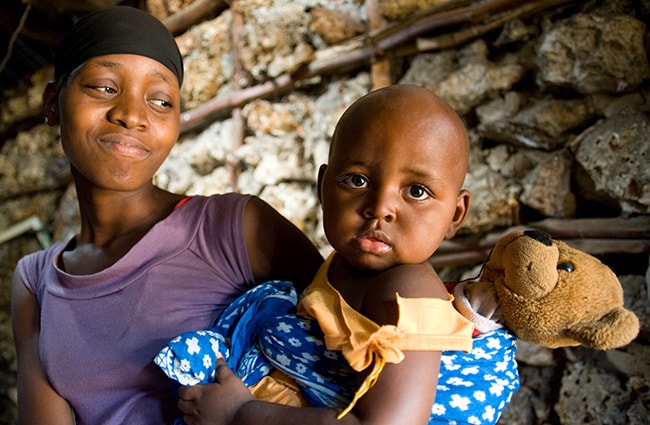Meaningful Changes for Kenya’s Moms-to-Be
September 6, 2018

A mother and child in Kenya. Photo: David Snyder, CDC Foundation.
As the saying goes, sometimes the little things mean the most.
In the Kenyan sub-county of Kisumu East, where the infant mortality rate is three times the national average, mothers-to-be weren’t receiving the recommended care. Dr. Lydia Kilowua wanted to understand why.
She began by conducting a community health assessment — a strategy she learned during her fellowship with CDC’s Improving Public Health Management for Action (IMPACT) program.
IT ALL BEGINS WITH LISTENING
Through a series of focus group discussions, key informant interviews, and a qualitative questionnaire, Dr. Kilowua discovered that over 78% of women in Kisumu East did not complete all four recommended visits at antenatal clinics. However, she was surprised to find that the primary issue was not quality of care, but rather a setup that was far from patient-centered.
Why? Wait times at clinics averaged more than two hours. The total cost for blood work, ultrasounds, and transportation was prohibitive for more than half the women surveyed. Close to 60% of women felt that the trek to their nearest clinic was too arduous and not worth the effort. A rotating staff of care providers at the clinic left women feeling disconnected.
IMPACT is a fellowship program that aims to build a cadre of highly trained public health managers throughout the world. The program is founded on the understanding that strong management will help IMPACT countries more effectively translate research, theory, and scientific innovation into successful public health action.
INVOLVING THE COMMUNITY IN SOLUTIONS THAT WORK
Looking at the data led Dr. Kilowua to question how she could make the antenatal clinic a more welcoming place for women. She found the answer in Traditional Birth Attendants (TBAs). Skillful and well-trained by the government, TBAs stay with the mother throughout the pregnancy and delivery. They meet women’s needs for someone familiar, secure, and responsive. TBAs also often accept non-cash payment such as goats or chickens, making them affordable.
Dr. Kilowua found that TBAs were in good supply in the sub-county. While they are not as prepared as doctors and nurses to handle complicated births, TBAs represented a cost-effective use of a health system’s resources, making care more accessible and reducing the load on midwives and doctors.
Dr. Kilowua proposed that Kisumu East harmonize the efforts of the antenatal clinics and the TBAs to better support the women by making TBAs part of all outreach activities. An important component of this process is ensuring that solutions are community-led, or in this case, clinic- and TBA-led.
USING DATA TO DRIVE POSITIVE CHANGE
Dr. Kilowua suggested other solutions based on the data she collected, such as offering water, Wi-Fi, and TV in clinic waiting areas, as well as working long-term to build more facilities in remote locations. Maintaining strong relationships within Kisumu East’s communities will ensure support for these and other grassroots solutions.
The IMPACT fellowship teaches public health officials in low-resource countries how to think deeply to solve problems. Dr. Kilowua’s work is an example of how taking time to assess the current state of affairs can lead to straightforward, effective, and affordable strategies that solve challenges. And how, if we have the skills to find the right approach, even small changes can make a big difference.